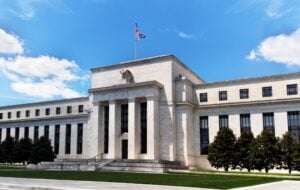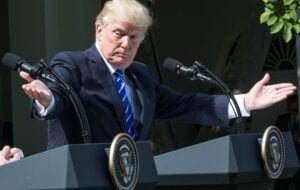
Former New York Fed president William Dudley recently created a stir by urging the Fed to “refuse to play along” with President Trump’s trade war with China. It’s rare to see a current or recently retired Fed official venture into the realm of partisan politics. But Dudley’s article is worth examining in greater detail. His analysis for why the Fed shouldn’t play ball with President Trump’s trade war is half right — but half very, very wrong.
Dudley is right to question the desirability of accommodating a trade war. “[W]hat if the Fed’s accommodation encourages the President to escalate the trade war further, increasing the risk of a recession?” he writes. “The central bank’s efforts to cushion the blow might not be merely ineffectual. They might actually make things worse.”
With this in mind, Dudley concludes that the Fed should “state explicitly that the central bank won’t bail out an administration that keeps making bad choices on trade policy.”
The problem, on this point, is that Dudley does not go far enough. Despite what Dudley describes as “conventional wisdom,” a central bank should never try to ease the blow of bad government policies by pushing interest rates lower than they otherwise would. Monetary policy is only effective at combating nominal disturbances. Government efforts to wage trade wars, cut taxes, or overhaul the regulatory regime affect real productivity.
As I’ve argued before, the effects of trade restrictions are effectively the same as those of a natural disaster that wipes out foreign factories or any other interruption to the international division of labor. Printing money cannot dry up a flood or produce more rainfall in a drought. And it cannot fix the very real problems that result from a trade war. Trying to accommodate a negative real shock merely distorts the rest of the economy.
What should the Fed do during a trade war? Its “response” should be to keep doing what it should always do: whatever is necessary to stabilize total nominal spending (i.e., aggregate demand). Such a policy would allow the negative effects of the trade war — higher prices and lower real output — to occur while preventing it from snowballing into a general downturn.
The problem with Dudley’s advice is not his call to inaction, but rather the hyper-political rhetoric employed to make that call. “I understand and support the Fed official’s desire to remain apolitical,” he writes. “But Trump’s ongoing attacks on Powell and on the institution have made that untenable.” In Dudley’s view, “[c]entral bank officials face a choice: enable the Trump administration to continue down a disastrous path of trade war escalation, or send a clear signal that if the administration does so, the president, not the Fed, will bear the risk — including the risk of losing the next election.”
Dudley certainly goes too far in suggesting the Fed should consider short-term electoral politics when setting policy:
There’s even an argument that the election itself falls within the Fed’s purview. After all, Trump’s reelection arguably presents a threat to the U.S. and global economy, to the Fed’s independence and its ability to achieve its employment and inflation objectives. If the goal of monetary policy is to achieve the best long-term economic outcome, then Fed officials should consider how their decisions will affect the political outcome in 2020.
And, in making the case in such blatantly partisan terms, Dudley has made it all the more difficult for the Fed to do the right thing.
Fortunately, economists from all across the political spectrum were quick to condemn Dudley’s politicized rhetoric. “Staying above the political fray,” as Dudley himself acknowledges, “helps the central bank maintain its independence.”
Unfortunately, there is much less agreement on the equally important question of whether a central bank should actively try to accommodate the president’s trade war.
Fed officials need not couch their actions in partisan rhetoric. They need not state that the Fed “won’t bail out an administration that keeps making bad decisions” or discuss the merits of ousting a sitting president, as Dudley suggests. Instead, they might merely adopt and credibly commit to a nominal spending target. Then, when the president complains about rising prices and falling real growth, they can point to the trade war. “It is not us,” Fed officials might say. “It’s you.”




